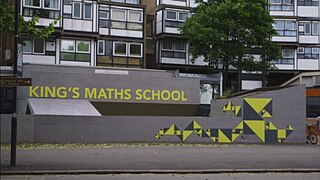
In England, a City Technology College (CTC) is an urban all-ability specialist school for students aged 11 to 18 specialising in science, technology and mathematics. They charge no fees and are independent of local authority control, being overseen directly by the Department for Education. One fifth of the capital costs are met by private business sponsors, who also own or lease the buildings. The rest of the capital costs, and all running costs, are met by the Department.

Language Colleges were introduced in 1995 as part of the specialist schools programme (SSP) in the United Kingdom. The system enabled secondary schools to specialise in certain fields, in this case, modern foreign languages. Schools that successfully applied to the Specialist Schools Trust and became Language Colleges received extra funding for language teaching from this joint private sector and government scheme. Language Colleges act as a local point of reference for other schools and businesses in the area, with an emphasis on promoting languages within the community. They are also encouraged to develop links with schools and other institutions in foreign countries. There were 216 Language Colleges in the country by 2010.

The specialist schools programme (SSP), first launched as the Technology Colleges programme and also known as the specialist schools initiative, specialist schools policy and specialist schools scheme, was a government programme in the United Kingdom which encouraged state schools in England and Northern Ireland to raise private sponsorship in order to become specialist schools – schools that specialise in certain areas of the curriculum – to boost achievement, cooperation and diversity in the school system. First introduced in 1993 to England as a policy of John Major's Conservative government, it was relaunched in 1997 as a flagship policy of the New Labour governments, expanding significantly under Prime Minister Tony Blair and his successor Gordon Brown. The programme was introduced to Northern Ireland in 2006, lasting until April 2011 in England and August 2011 in Northern Ireland. By this time, it had established a near-universal specialist system of secondary education in England, with almost every state-funded secondary school in England having specialised. This system replaced the comprehensive system which had been in place since the 1970s.

An academy school in England is a state-funded school which is directly funded by the Department for Education and independent of local authority control. The terms of the arrangements are set out in individual Academy Funding Agreements. 80% of secondary schools, 39% of primary schools and 43% of special schools are academies.
SSAT Limited is a UK-based, independent educational membership organisation working with primary, secondary, special and free schools, academies and UTCs. It provides support and training in four main areas: teaching and learning, curriculum, networking, and leadership development.

An Arts College, in the United Kingdom, is a type of specialist school that specialises in the subject fields of the performing, visual, digital and/or media arts. They were announced in 1996 and introduced alongside Sports Colleges to England in 1997, being one of the five "practical specialisms" of the specialist schools programme. They were then introduced to Scotland in 2005 and Northern Ireland in 2006. By 2011, when the programme ended, there were over 491 Arts Colleges in England. More have been introduced since then, however schools must be an academy, free school or use the Dedicated Schools Grant to become one.

In the United Kingdom, a Technology College is a specialist school that specialises in design and technology, mathematics and science. Beginning in 1994, they were the first specialist schools that were not CTC colleges. In 2008, there were 598 Technology Colleges in England, of which 12 also specialised in another subject.

Engineering Colleges were introduced in 2002 as part of the Specialist Schools Programme in England. The system enabled secondary schools to specialise in certain fields, in this case engineering. Schools that successfully applied to the Specialist Schools Trust and became Engineering Colleges received extra funding for teaching from this joint private sector and government scheme. Engineering Colleges act as a local point of reference for other schools and businesses in the area. Schools can currently become Engineering Colleges through the Dedicated Schools Grant or by becoming an academy. This is because the Specialist Schools Programme has been defunct since 2011.

Mathematics and Computing Colleges were introduced in England in 2002 and Northern Ireland in 2006 as part of the Government's Specialist Schools programme which was designed to raise standards in secondary education. Specialist schools focus on their chosen specialism but must also meet the requirements of the National Curriculum and deliver a broad and balanced education to all their pupils. Mathematics and Computing Colleges must focus on mathematics and either computing or ICT.

Humanities Colleges are a type of specialist school introduced in 2004 as part of the Specialist Schools Programme in the United Kingdom. The system enabled secondary and primary schools to specialise in certain fields, in this case, humanities. Schools that successfully applied to the Specialist Schools Trust and became Humanities Colleges received extra funding from this joint private sector and government scheme. Humanities Colleges act as a local point of reference for other schools and businesses in the area, with an emphasis on promoting humanities within the community.

Music college has a different meaning in the United Kingdom and Russia.

Science Colleges were introduced in 2002 as part of the now defunct Specialist Schools Programme in the United Kingdom. The system enabled secondary schools to specialise in certain fields, in this case, science and mathematics. Schools that successfully applied to the Specialist Schools Trust and became Science Colleges received extra funding from this joint private sector and government scheme. Science Colleges act as a local point of reference for other schools and businesses in the area, with an emphasis on promoting science within the community.

Sports Colleges are senior secondary schools which promote sports alongside secondary education.

The Department for Education (DfE) is a department of His Majesty's Government responsible for child protection, child services, education, apprenticeships, and wider skills in England.

A free school in England is a type of academy established since 2010 under the Government's free school policy initiative. From May 2015, usage of the term was formally extended to include new academies set up via a local authority competition. Like other academies, free schools are non-profit-making, state-funded schools which are free to attend but which are mostly independent of the local authority.

Specialist schools in the United Kingdom are schools with an emphasis or focus in a specific specialised subject area, which is called a specialism, or alternatively in the case of some special schools in England, in a specific area of special educational need. They intend to act as centres of excellence in their specialism and, in some circumstances, may select pupils for their aptitude in it. Though they focus on their specialism, specialist schools still teach the full curriculum. Therefore, as opposed to being a significant move away from it, the specialism is viewed as enriching the original curricular offer of the school.

A studio school is a type of specialist secondary school in England that is designed to give students practical skills in workplace environments as well as traditional academic and vocational courses of study. Like traditional schools, studio schools teach the National Curriculum and offer academic and vocational qualifications. However, studio schools also have links to employers and offer education related to work.

Applied Learning Colleges, formerly Vocational Colleges, were introduced in 2006 as part of the Specialist Schools Programme in England. The system enabled secondary schools to specialise in certain fields, in this case, vocational education. Schools that successfully applied to the Specialist Schools Trust and became Applied Learning Colleges received extra funding from this joint private sector and government scheme. In order to fulfil the criteria for Applied Learning College status schools had to either be designated as a High Performing Specialist School or select it as part of a combined specialist when first specialising. By 2009, 164 schools had specialised into an Applied Learning College.

A maths school is a type of specialist free school sixth form college in England which specialises in the study of mathematics. Each maths school is sponsored by a university and, frequently, also a nearby established sixth form college or multi-academy trust. All students in a maths school must follow a course of study that includes A-Levels in mathematics and further mathematics.

Specialist schools, also known as specialised schools or specialized schools, are schools which specialise in a certain area or field of curriculum. In some countries, for example New Zealand, the term is used exclusively for schools specialising in special needs education, which are typically known as special schools.



















